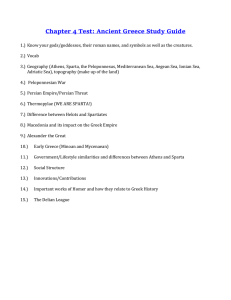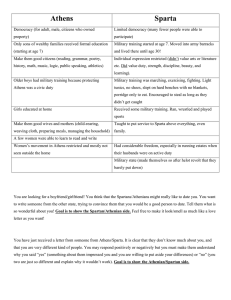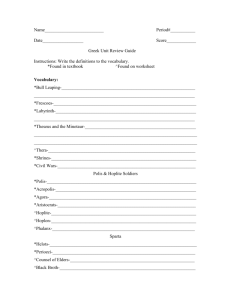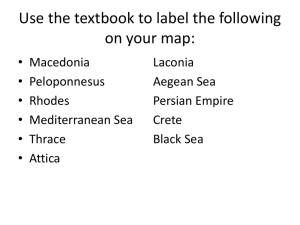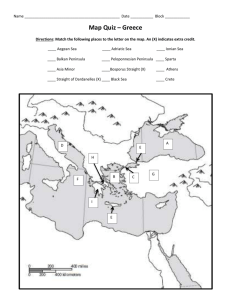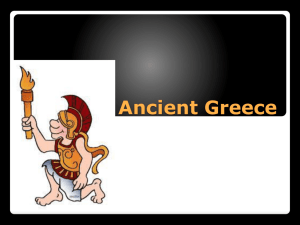The Greek World
advertisement
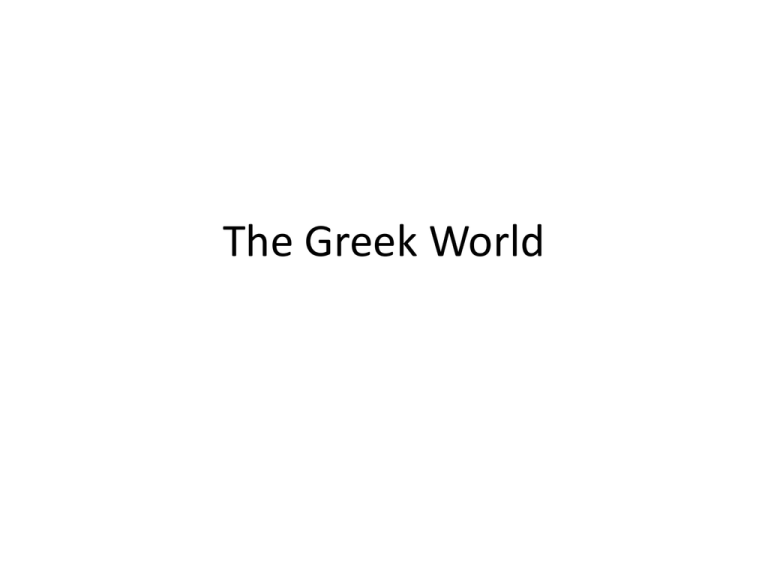
The Greek World Geography Greece is very mountainous • 75% of Greece is covered by mountains • Difficult to farm Surrounded by seas • Greece is located on the Balkan Peninsula • Made trade easier Factors of Greece location Cut off by mountains and the seas • Isolated – Led to the formation of city-states – Limited interaction and unity of Ancient Greece – Created fierce rivalries • Sea became a vital link – Hundreds of bays to provide safe harbor for ships – Skilled sailors • Traded olive oil, wine, and marble • Returned with grains, metals, and ideas – Adapted the Phoenician alphabet – Became basis for all Western alphabets Minoans • • • • First Greek civilization Located on the island of Crete Palace of Knossos Religion included animal sacrifices and offerings • Written script (Linear A) • Invading Mycenaean ended Minoan rule. Mycenaean • First Bronze Age • More warlike than Minoans – Military adventures recounted in the poetry of Homer • Agamemnon, King of Mycenae (Troy) • Linear B (adopted from Linear A) • Declined due to war among rival kings or Dorian invaders Homer • Ionian poet • Facts are debated • Epic poem – Iliad – Odyssey (Final days of Trojan War and ten years afterward) Trojan War • Around 1260 BC • Troy was attacked – Due to Spartan King Menelaus’ wife abduction – Combined forces with brother, Agamemnon (King of Mycenae) War ended when a gift horse was delivered in to the walls of Troy City States • Greece consisted of city states or “polis”. – Small communities – Clusters of farms and houses – Surrounding a fortified citadel or (acropolis) • Functioned as a unity against external enemies • Greatest city states – Athens – Sparta Government • Political rights adult males • No political rights – Women & children – Slaves – Laborers – Resident aliens Athens • Largest city state • Quarter of a million people • Came under control of tyrants – Pisistratus • • • • Ruled for more than 30 years Boosted trade abroad Fostered the arts Encouraging religious and cultural festivals Athens • Located on the peninsula of Attica • Early Athens – Ruled by a king – 7th Century BC oligarchy w/ aristocrats • A small group of people having control over a country, organization, or institution • Owned the best land and controlled political life Athens • End of 7th Century – Political turmoil due to economic problems • Farmers were sold to aristocrats as slaves if they could not pay their debt caused cries to give land to poor (Civil War in the near future?) • 594 BC – Solon takes control – Reform-minded aristocrat – Given power by the aristocrats – Cancelled all land debts Athens • Solon (cont’d) – Freed people who had fallen into slavery – Refused to take land from rich to give to poor • Despite reforms, aristocrats were still powerful • Poor peasants could not obtain land – Reforms led to internal strife, leading to tyranny Athens • 560 BC – Peisistratus now the leader – Athenian trade to please merchants – Unlike Solon, gave aristocrats’ land to poor to gain favor • 510 BC – Athenians rebelled against Peisistratus’s son – Two years later, Cleisthenes (backed by aristocrats) now leads Athens • Cleisthenes (cont’d) – Created a council of 500 that dealt w/ foreign affairs, treasury, and proposed laws – Assembly (of men) given final authority to pass laws after open and free debate – Created foundation for Athenian democracy Sparta • Did not gain new lands by starting them, but by conquering them • 730 BC – took over Messenia (larger size and population) – Messenians became serfs for Spartans • An agricultural laborer bound under feudal system to work on his lord’s land • Also known as Helots (Greek word for “capture”) • Thus creating a military state Sparta • 800-600 BC – Spartans lived a very structured life style – Creating term of “spartan” meaning “highly selfdisciplined” – Males: • Spent childhood learning military discipline • Enrolled in army at 20 • Allowed to marry but lived in barracks till 30 – At 30, allowed to vote in assembly Sparta • Males (cont’d) – After 30, could live at home but stayed active in military duty till 60 • Females: – Lived at home (creating greater freedom of movement and power w/in household) – Expected to remain fit to bear and raise healthy children – Expected husbands and sons to be brave in war • “Come back carrying your shield or being carried on it” Sparta • Government – Oligarchy (headed by two kings) – Ephors – group of five men responsible for education of youth and conduct of citizens – Council of elders (two kings and 28 citizens over 60) decide on issues that are presented to an assembly made of citizens • Not a debate, only voting Sparta • Culture – Turned back on the outside world – Foreigners were discouraged from visiting – Not allowed to travel – Discouraged from studying philosophy, literature, and art (studying Art of War was ideal) Sparta • Military state • Leadership of Lycurgus – Maintained a primitive monarchical government. – Relied solely on army for protection Trade • Athens were excellent mariners – Colonies in Emporium (northern Spain) – Phasis (on the Black Sea) – Traded with the Etruscans in Italy – Phoenicians to the east – Stimulated economic growth and political development – Elite class and the city of Athens Politics • Athens enter a democratic period for 200 years. • Liberty and equality – Excluded women and slaves • Three organs of government. – Areopagus – Council of Five Hundred – The Assembly Crime and Punishment • The first use of juries in Athens coincided with the founding of Athenian democracy in 590 B.C. • A council ran both the government and the court system (the aristocrats). • Greek were as litigious as we are today! – Litigious: Quarrelsome, tending or wanting to take legal action. Religion • • • • • • Polytheistic Influenced by Asian deities Supreme god is Zeus Mount Olympus- home of the gods Acropolis had own god/goddess for protection Parthenon – Athens temple dedicated to Athena Myth and Folklore • Homer – Debated if he existed • Reason for the Trojan War – Debated as mythical • Odysseus – Folklore – Known for being cunning and deceitful Classical Greece • Around 900 BC (after Mycenaean civilization) – Influx of Dorians (north) – Sea peoples (south) • Greek Dark Ages – Decline in Greek palace culture – Colonization across the Ionian coast Religion • Polytheistic – belief in many gods • Major Gods/Goddesses lived atop Mount Olympus (highest in Greece) • Gods intervened with humans in daily life – Oft times to teach lessons • Zeus was the top dog – Favorite Weapon: thunder bolt – Myth… Religion • Greeks created gods in the image of humans – Gods constantly fought among themselves, behaved irrationally, and were oft jealous of each other • Greek religion did not have a standard set of morals (i.e. No Ten Commandments) • Explained how the world came to be (i.e. Pandora’s Box and Hercules’ Labors) Literature • Gods were oft put into literature (i.e. Homer’s Iliad and Odyssey) – Iliad – an epic poem about the events of the Trojan War – Odyssey – epic poem about the travels of Odysseus • Athens threw many dramas (plays) and citizens felt it was civic duty to attend as many as possible Literature • Dealt with: important issues, posed tough questions, and educated theatergoers. – Gov’t would oft times pay for tickets • Literature was passed down from generation to generation by word of mouth – Wasn’t written until years later Literature • Another type of poems – lyric – Sappho most famous lyric poet • Known for her writings about the world around her and focused on love and sexuality • Word “lesbian” comes from Sappho’s island of birth, Lesbos Literature • Age of Pericles – 461-429 BC • Outdoor theaters were built • Scenes of actual wilderness became backdrops of the stage • Festivals were plays competed against one another – Always tribute the gods Literature • Tragic – Strong central character/hero ultimately fails and is punished by gods Philosophy • Socrates – found himself on trial for his teachings – Corrupting the youth of Athens – Drank hemlock (poison) – On trial for questioning the Athenian gov’t • Plato – student of Socrates – Wrote ideas down, unlike Socrates – Wrote The Republic stating ideal state (which was not very democratic) Philosophy • Aristotle – Plato’s student – Very scientific mindset – Emphasized importance of observations and gathering of data – Believed Earth was center of universe • Hippocrates – student of medicine (Hippocratic Oath) • Pythagoras - mathematician (Pythagorean Theorem) Peloponnesian War • Athens and Sparta were allies against Persia • Persian King Darius lead an attack on Athens – Due to Athens support of the Ionian city-state • Athens sent 20 ships • Led to the burning of Persian city of Sardis • Persians second attack by Xerxes, son of Darius – Successfully approached through the Thermopylae pass – Defeated at the Battle of Salamis by the Athenians Peloponnesian War • Athens power and influenced rose – Land and capital • Upon Persia’s defeat, rivalry sparked • Athenian naval supremacy – Increased the wealth of the city – Broke the Greek alliance that was established during the Peloponnesian War – Envy rose against Athens • Sparta proved victorious – Outbreak of the plague (Pericles ) • The battle between Athens and Sparta was a war of land verse naval power Pan-Hellenism • Hellenism- Greek culture/ideas • Delphi was the sanctuary – – – – Located at the foot of Mount Parnassos Considered the center of the earth Dedicated to Apollo Oracles directed in the matters of war, love and business • Amphyctionic League – Center of the sanctuary – Powerful political organization – Consist of Delphic priest Olympia • Located in the Western Peloponnese • Dedicated to Zeus • First Olympic games held 776 BC – Commemorate the victory of Pelops in a chariot race – Attributed to Heracles Hellenistic Empire Rise • Sparta used Persian support to build a fleet – Won the battle of Aegospotami in 405 BC • Athens became a vassal state of Sparta – Athens restored independence – Never regained power • Sparta was defeated by Thebes • 338 BC Ancient Greece became the new Hellenistic Empire. Alexander the Great • Expanded Greek rule and expanded the economy, language and cultural ideas • Known for his military strategy and ability to fight in any geographical location • Goal was to merge Greeks, Macedonians and Persians • Greek became the primary language – Business transactions – Government positions Homework Greek Philosophies • Explain the following quotes and its significance as it pertains to you: • • 1. Cleverness is not wisdom - Euripides • • 2. Of prosperity mortals can never have enough - Aeschylus • • 3. Always desire to learn something useful - Sophocles • • 4. A good decision is based on knowledge and not numbers - Plato • • 5. The only true wisdom is in knowing you know nothing - Socrates

